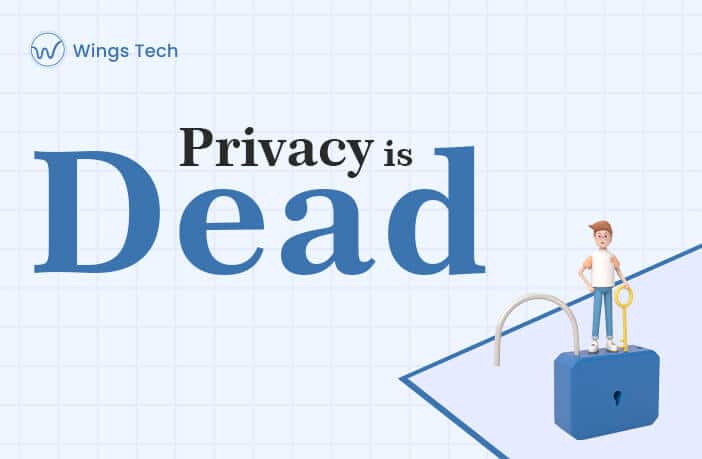Privacy Is Dead, And Social Media Holds The Smoking Gun

We might find this contradictory, and it’s a little scary to admit.
Privacy must be prioritized in the digital age. Would you agree that secret blanket surveillance is obscene? There is no point in relying on the government to protect our privacy, as it would be like having a peeping to install your window blinds.
Today’s life is breathed by information. The smell wafts across electrified borders and passes through barbed wire-covered walls. It is no secret that social media has become one of the biggest phenomena of our time. A social media site allows you to connect with a wide range of people, experience things you wouldn’t otherwise have access to, and share your accomplishments and experiences.
There are sometimes bad things that follow good things. Our conversation discusses the so-called digital risks we willingly accept when embarking on another new social media life or living digitally and becoming concerned about how much of our real lives are projected online. The impact of social media platforms goes beyond shaping a person’s digital identity, but it can also affect their cyber security online and off.
Social media can boost or bust your account’s success. These are the 8 most common social media mistakes often overlooked, but with unpleasant results once committed.
1. Making Everything Public
The data will confess anything if you torture it.
Social media can be a great way to catch people’s attention, but it’s not wise to post everything publicly. When setting up our social media accounts, we often overlook changing the privacy settings. Almost all platforms automatically make your account public by default. This is not the kind of thing you want. People can stalk you more easily if you have a less private account. Keeping your account private will help you avoid these and more serious dangers.
2. Geotagging
Geotagging is extremely helpful. This lets people know where you are, whether it’s a foreign country or a restaurant where you’re dining. You’d be better off waiting until after you’ve left the specified location before making your location public if you insist on adding it to your post. In the same fashion, you should check in at a place on Facebook just before leaving, or just after you leave. Keeping your location secret keeps you safe while sharing your whereabouts.
3. Posting Too Much Online
It’s always better not to give too much away online, even if you have your accounts set to private. The internet is a permanent place, and whatever you put there will remain there for the rest of your life. Your private posts and information may still be accessible to hackers out there. Online, do not give out personal information, as doing so puts you at risk of identity theft and can even allow hackers to steal your money.
4. Falling for Click baits
By clicking dangerous links, you may land on clickbait sites that sell what they promise, or possibly extort you by not delivering what they promise. Today, this is everywhere on the internet, so surf safely and avoid opening links just for fun. Rather than letting yourself be taken advantage of, stay away from them because they’re fakes and frauds.
5. Making Friends Without Thinking Twice
It has become a trend and a form of competition to have more friends or followers but think twice before adding someone you don’t know, because they may not have the right intentions. Maybe you met this person at a party once, or perhaps you went to kindergarten together, or hey, you may have never seen this person in your life, but you have three mutual friends! – does that mean they should be allowed to see everything you’ve been up to?
6. Reusing passwords on multiple accounts
The first rule of cyber security hygiene. One password — one account. If one account is compromised, you won’t risk other accounts that use the same password. There is no doubt that managing the many passwords that users now can have, which can amount to fifty or hundred, can be challenging. Nonetheless, if you want to keep your passwords in one place and secure your account’s access, you can always choose a trusted password manager.
Passwords are like underwear: don’t let people see them, change them often, and don’t disclose them to anyone.
7. Spending Too Much Time Online
The more time you spend online instead of living in the moment and spending time with your family and friends, the more it will affect your relationships and health in the long run. Living your life as you are and to the fullest is more important than validation from the outside world.
8. Neglecting some security essentials
Among the most important security measures are enabling two-factor (2FA) or multi-factor authentication (MFA), securing social media accounts, and preventing strangers people from accessing your account. In the future, if you need to deal with a cyber-attack or data breach, these settings will save you a considerable amount of time. The majority of social media platforms provide tutorials on how to follow security essentials regarding your safety on them and how to apply them.
Social Media Risks in a Nutshell
Is there anything you’re guilty of making on social media?
No matter what the reason is, don’t feel bad about it. We cannot change the past, but we can learn from it.
By following the information above, you can avoid fatal social media mistakes that waste time, money, and resources and damage your reputation. You will be able to master social media marketing in less time and with better results, if you have a solid social media and content strategy, basic guidelines for your team, planning, and a basic analysis and review process in place. You will be able to accomplish your social media tasks in even less time and with fewer resources by using smart tools and plugins. Boost engagement, leads, and conversions with social media by leveraging its full power.
Can we improve our social media presence in any way? Your feedback would be greatly appreciated!

















